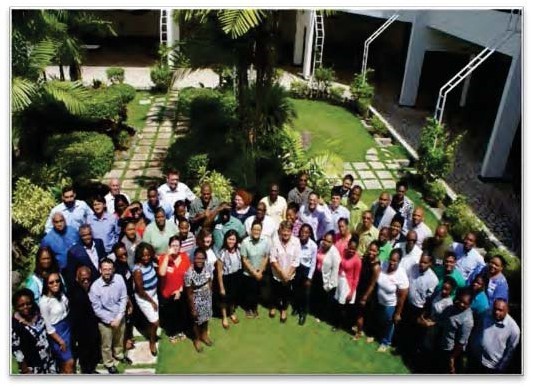![]()
The Cowrie – SIDS Times Magazine Fall 2017 Online Edition – Back to Table of Contents

Caribbean Waste Management Conference
The diverse nature of biodiversity and wildlife in the Caribbean makes the islands popular “go-to” stops for tourists. Rich marine life and fertile lands also provide food for its families, jobs for its people and revenue for its economies.
However, growing populations and increased consumption of resources have made Caribbean Small Islands Developing States (SIDS) particularly vulnerable to high concentrations of solid waste and plastic litter, far beyond the capacity of the region to cope.
Most islands have been engaged in a balancing act to ensure that their islands remain attractive to tourists and sustain wildlife while ensuring that waste does not overflow their boundaries. But sometimes it does overflow.
Marine debris, which comprises of “any persistent, manufactured or processed solid material that is discarded, disposed of, or abandoned in the marine or coastal environment” (UNEP 2009), especially obvious during rainy periods, impact key industries; which in turn lower the resilience of local economies.
Caribbean SIDS also face other challenges in tackling waste; their small size raises a significant challenge in organising inter-island logistics, and their limited resources lead to bigger challenges regarding the management of waste compared to their mainland counterparts.
Nevertheless, there have been significant strides in waste management for several Caribbean countries.
At the recently concluded Caribbean Waste Management Conference, held in Jamaica from July 4-6 at the Jamaica Conference Centre, UN Environment, in collaboration with the Government of Jamaica and the Kingdom of the Netherlands, Caribbean countries were allowed to share their achievements, their hopes for inter-country strategies as well as solid plans for the future of the waste management in the Caribbean.
Most evident was the shift from the current linear “take- make-use-dispose” tendencies towards a more circular economy.
A circular economy focused on a number of actions, including: re-thinking and redesigning products and packaging, implementation of business processes to ensure that the utility and value of discarded materials is maximised as well as increased resource efficiency through activities aimed at reducing resource consumption and creating an enabling policy environment that will encourage more sustainable consumption patterns based on the 3 Rs: reduce, reuse and recycle.
Several islands have already taken steps to integrate the circular economy into their national policies through local initiatives and targeted actions. These include steps to substitute plastic and Styrofoam with biodegradable, recycled content, compostable materials and products and the introduction or increase of already existing circular economy products, for instance, sugarcane bagasse, recycled PET bottles, burlap/crocus/jute, cotton/linen canvas and hemp.
These are products that place value on local knowledge, prioritising locally available products and therefore, ensuring sustainability.
Since 2016, Antigua has banned the importation of plastic bags, in an effort to decrease the pollution levels in the country’s waters. The government has even been willing to waive duties and other taxes to assist the private sector as they seek alternatives to the use of plastic bags.
Similarly, Guyana has banned the use of Styrofoam which currently contributes to approximately 2-5% of the waste stream and is primarily used in the food service industry.
Trinidad and Tobago, Dominica and Jamaica are all taking steps to address their waste problem.
Jamaica generates approximately 1.2 million tonnes of solid waste every year, 75% of which ends up in the landfill and only a small portion of the remaining 25% is recycled by small operators.
With a recently launched Plastic Waste project combined with other in- country initiatives, Jamaica aims to reduce the high volume of plastic waste, mostly PET bottles.
During the Caribbean Waste Management Conference countries compiled their best practices implemented in the region and lessons learnt from strategies that were not as successful. These will result in a strategy document and a call to action – “A Guide to Best Practice for the Caribbean”.
However continued follow-up is critical and Caribbean governments cannot do it alone.
Every person must take responsibility and engage in activities that will sustainably address the problem.
Governments, civil-society and the private sector must work hand in hand in order to ensure a way forward for the Caribbean.
It is time to act! The challenges are too large for any one country acting alone. Success, therefore, depends on working together in a concerted way within countries and across borders.
By Deonne Smith(deonne.smith@unep.org) Communications and Partnerships Officer
UN Environment Caribbean Sub-Regional Office. Sources:
http://caribbeannewsservice.com/now/antigua-bans-importation-of-plastic-bags/
http://www.caribjournal.com/2015/10/18/this-caribbean-country-is-banning-styrofoam/